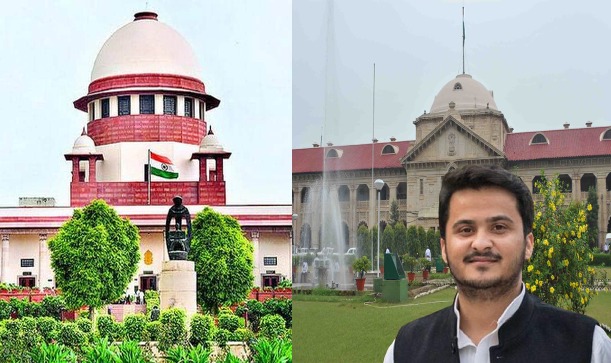
The Supreme Court recently directed the Allahabad High Court to hear Abdullah Azam Khan’s petition for the suspension of his conviction in a 15-year-old case for staging a dharna on a state highway.
A bench of Justice K M Joseph and Justice B V Nagarathna was hearing senior Samajwadi Party (SP) leader Azam Khan’s son Abdullah Azam Khan’s petition against the high court’s March 17 order, which had asked the state to respond to the appeal within three weeks but had not stayed the session court’s order.
The bench stated that the application for suspension of conviction can be heard by the High Court.
It requested that the petitioner appear before the high court on April 10 and that the matter be heard on that date.
While hearing the plea on March 29, the Supreme Court directed senior advocate Vivek Tankha and advocate Sumeer Sodhi appearing for Khan to serve a copy of the petition on the Uttar Pradesh government’s standing counsel and scheduled the matter for hearing today.
Khan was a juvenile at the time of the offense, according to Advocate Tankha, and thus his conviction should be stayed. He claimed that the high court erred by failing to stay the session court’s order.
“The high court failed to appreciate the fact that if the application is not decided expeditiously then the same would be rendered infructuous and the petitioner would suffer irreparable harm which no court of competent jurisdiction would be able to undo even if the application is decided in favour of the petitioner,” Khan said in his plea. Giving the specifics of the case, he stated that on February 13, the trial court convicted him of offenses including Section 353 of the Indian Penal Code (IPC) and sentenced him to two years in simple imprisonment with a fine of Rs 2,000.
According to him, the Uttar Pradesh Legislative Assembly secretariat notified him on February 15 that the Suar constituency in Rampur district of Uttar Pradesh, which he represented as MLA, had become vacant with effect from February 13.
Khan stated that he appealed the trial court’s verdict before additional sessions judge Rampur, as well as filing an application for a stay of conviction, but the court dismissed both the plea and the application on February 28.
He stated that he approached the high court on the same day to challenge the order of the sessions court, but on March 17, the high court granted the state government three weeks to respond to his plea.
“In a nutshell, the petitioner’s case before this court is that the impugned order passed by the high court is bad in law because it was passed without taking into account the urgent requirement of the issues involved in the petitioner’s application,” the plea stated.
Khan claims that failure to hear his application in a timely manner will render it futile, and that it is therefore critical that the high court hears the application as soon as possible, given the potential consequences of the conviction and sentence, which may include re-election to his assembly seat in the assembly.
He claims that his conviction is legally unsustainable because he was a minor at the time the offense was committed.
“There are judicial orders stating that the petitioner’s date of birth is January 1, 1993, implying that the petitioner was only 15 years old at the time of the alleged offense. As a result, the entire trial process is flawed,” he claims.
Khan, Abdullah Azam, and seven others were charged in 2008.
Khan sat on a dharna on a state highway on January 29, 2008, as their cavalcade was stopped by police for questioning in the aftermath of a December 31, 2007 attack on a Central Reserve Police Force (CRPF) camp in Rampur, Uttar Pradesh.
The complaint was filed at the Chhajlait police station. While Khan and Azam were sentenced to two years in prison under Section 353 of the IPC (using criminal force to prevent a public servant from performing his duties) and other provisions, the seven other accused were exonerated. If an MLA or MP is convicted and sentenced to two years or more in prison in a criminal case, he or she is automatically disqualified.




